 Orbital by Samantha Harvey
Orbital by Samantha Harvey Narrator: Sarah Naudi
Format: audiobook, ebook
Source: borrowed from library
Formats available: hardcover, paperback, ebook, audiobook
Genres: literary fiction, science fiction
Pages: 207
Length: 5 hours and 7 minutes
Published by Atlantic Monthly Press on December 5, 2023
Purchasing Info: Author's Website, Publisher's Website, Amazon, Barnes & Noble, Kobo, Bookshop.org, Better World Books
Goodreads
The earth, from here, is like heaven. It flows with colour. A burst of hopeful colour.
A book of wonder, Orbital is nature writing from space and an unexpected and profound love letter to life on Earth
Six astronauts rotate in their spacecraft above the earth. They are there to collect meteorological data, conduct scientific experiments and test the limits of the human body. But mostly they observe. Together they watch their silent blue planet, circling it sixteen times, spinning past continents and cycling through seasons, taking in glaciers and deserts, the peaks of mountains and the swells of oceans. Endless shows of spectacular beauty witnessed in a single day.
Yet although separated from the world they cannot escape its constant pull. News reaches them of the death of a mother, and with it comes thoughts of returning home. They look on as a typhoon gathers over an island and people they love, in awe of its magnificence and fearful of its destruction. The fragility of human life fills their conversations, their fears, their dreams. So far from earth, they have never felt more part - or protective - of it. They begin to ask, what is life without earth? What is earth without humanity?
My Review:
It begins in the morning, as all of their alarm clocks wake them for a brand new day. But all of those things are a bit, well, liminal, as day, night, and even sleep are all a bit nebulous and artificial for the six residents of the International Space Station.

The alarm clocks are real. Electronic, but still real. It’s the rest of the circumstances that are a bit adrift. Humans are tied to the 24-hour rotation of the Earth – but the ISS isn’t ON Earth. It’s rotating the planet in Low Earth orbit, 250 miles above the surface, 16 orbits per ‘day’.
So it’s artificially morning as decreed by ground control, an attempt to keep the humans aboard the ISS tethered to the planet of their origin. For the people involved, that tethering gets more than a bit unmoored as their mission goes on.
Because they experience MANY dawns every single orbit. It might not even be daylight under them or over them when they wake up – and even if it is it won’t be very soon.
But throughout the meticulous structure of their days, from observation to experimentation to being themselves part of the experiment of life in space, the planet and the life upon it is never far from their thoughts – even when it seems like it is.
This crew, astronauts Anton, Chie, Nell, and Shaun along with cosmonauts Pietro and Roman, may be the biggest part of this story but not the only part. Because they are all reflecting upon the life below them, their personal lives and the life of the planet, even as they look outward towards the future that has specifically just passed them by, literally as well as figuratively, as they and the rest of the world watch as four astronauts in a space capsule head on their outward journey back to the place where many of their own dreams of space began.
Escape Rating C+: I picked this entirely out of curiosity. Because it’s been labelled as science fiction but it won the Booker Prize, one of the big literary awards. In general, SF and Fantasy are the red-headed stepchildren of the literary world and just don’t win the big literary awards like the Booker. SF wins SF awards, and literary fiction wins the Booker.
Having finished this in audio, I’m at least clear on my answer to the conundrum. Orbital is very much in the Literary SF tradition, with the emphasis firmly on the literary in senses both good and less so.
 So if you’re looking at this as an example of SF, it’s really not. If you’re interested in literary SF there are better examples. I’m particularly thinking of Ray Nayler’s The Mountain in the Sea. If this makes you curious about SF and are looking for something that has a bit of this feeling but also has a real, honest-to-goodness PLOT, take a look at Becky Chambers’ To Be Taught, If Fortunate, which is also a love letter to Earth and the life upon it while still managing to GET somewhere as it goes.
So if you’re looking at this as an example of SF, it’s really not. If you’re interested in literary SF there are better examples. I’m particularly thinking of Ray Nayler’s The Mountain in the Sea. If this makes you curious about SF and are looking for something that has a bit of this feeling but also has a real, honest-to-goodness PLOT, take a look at Becky Chambers’ To Be Taught, If Fortunate, which is also a love letter to Earth and the life upon it while still managing to GET somewhere as it goes.
The audio narration by Sarah Naudi was utterly lovely, and does account for the plus in the grade. This is a relatively short book, and the beauty of the narration was enough to carry me through.
I liked the idea of this story, because space travel fascinates me. I loved the feeling of being in the astronauts’ and cosmonauts’ heads as they go about their work and the world revolves below them instead of underneath them. The prose is luminous and frequently rises to the poetic.
But there’s just not enough there to coalesce into an actual story. It’s more like a day in the life, and the whole point of each individual day in the life of the residents of the International Space Station is that it’s not supposed to be all that exciting. As one of them jokes, “If you’re an astronaut you’d rather not ever be news.” And he’s very much right.
In the end, I was left with the feeling that Orbital does its very best to never allow its bare scrim of a plot to get in the way of its poetry. Which made the individual observations lovely but does not a good story make. Nor does it make for good science fiction.
As always, your reading mileage may vary.

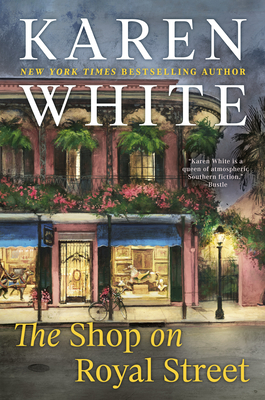 The Shop on Royal Street (Royal Street, #1) by
The Shop on Royal Street (Royal Street, #1) by 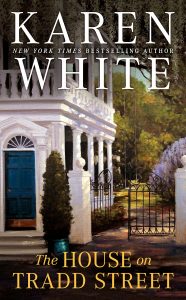
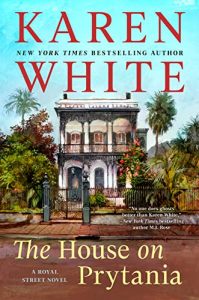 While one piece of the puzzle gets resolved by the end of The Shop on Royal Street, it’s just the tip of the iceberg of a long and bloody history – one that will probably take several books to resolve. As will the glimmer of a romantic possibility between Beau Ryan and Nola Trenholm – in spite of both of their intentions to stay out of each other’s way romantically and otherwise.
While one piece of the puzzle gets resolved by the end of The Shop on Royal Street, it’s just the tip of the iceberg of a long and bloody history – one that will probably take several books to resolve. As will the glimmer of a romantic possibility between Beau Ryan and Nola Trenholm – in spite of both of their intentions to stay out of each other’s way romantically and otherwise.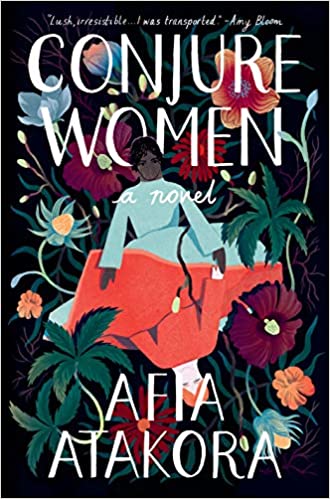 Conjure Women by
Conjure Women by 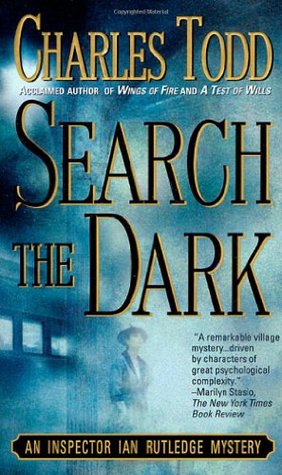 Search the Dark (Inspector Ian Rutledge, #3) by
Search the Dark (Inspector Ian Rutledge, #3) by 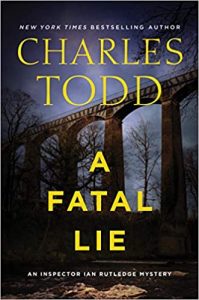 I picked this up because I was looking for a comfort read, as paradoxical as it is to find murder comfortable. Of course, I don’t find actual murder comfortable at all, but murder mysteries have to follow certain conventions – a body, a detective, a suspect, a few tasty red herrings – and I find that quite comfortable. I ended up here with Inspector Ian Rutledge because I just picked up a new book in the series (
I picked this up because I was looking for a comfort read, as paradoxical as it is to find murder comfortable. Of course, I don’t find actual murder comfortable at all, but murder mysteries have to follow certain conventions – a body, a detective, a suspect, a few tasty red herrings – and I find that quite comfortable. I ended up here with Inspector Ian Rutledge because I just picked up a new book in the series ( But what makes this series work is the dogged and tormented character of Inspector Ian Rutledge. He’s often caught between knowing that he’s right and fearing that he’s wrong. He’s afraid at every turn that he’ll fail, and that the result of that failure will condemn both an innocent and himself. He carries the seeds of his own destruction within himself, scared that others will see and judge him the less for them while knowing that they do. And yet, he can’t stop from trying, with every case, to reach for what is right. Even in a case like this one, where in the end his success has as many victims as his failure would have.
But what makes this series work is the dogged and tormented character of Inspector Ian Rutledge. He’s often caught between knowing that he’s right and fearing that he’s wrong. He’s afraid at every turn that he’ll fail, and that the result of that failure will condemn both an innocent and himself. He carries the seeds of his own destruction within himself, scared that others will see and judge him the less for them while knowing that they do. And yet, he can’t stop from trying, with every case, to reach for what is right. Even in a case like this one, where in the end his success has as many victims as his failure would have.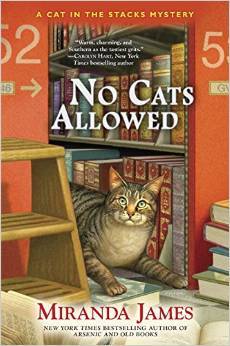 No Cats Allowed (Cat in the Stacks, #7) by
No Cats Allowed (Cat in the Stacks, #7) by 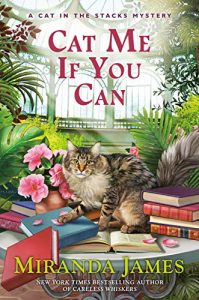 Unlike some other felines in cozies, Diesel is just a cat. A very big cat, and an extremely well-behaved cat, but definitely a cat. (Diesel weights 36 pounds, approximately the weight of all four of our cats combined!) He’s a comfort – and a comfortable – animal. And in spite of being very chatty, as cats can sometimes be, he doesn’t speak in English. Not that he can’t make himself perfectly understood by his human, but that’s a talent that all cats have. Cat owners will love using
Unlike some other felines in cozies, Diesel is just a cat. A very big cat, and an extremely well-behaved cat, but definitely a cat. (Diesel weights 36 pounds, approximately the weight of all four of our cats combined!) He’s a comfort – and a comfortable – animal. And in spite of being very chatty, as cats can sometimes be, he doesn’t speak in English. Not that he can’t make himself perfectly understood by his human, but that’s a talent that all cats have. Cat owners will love using 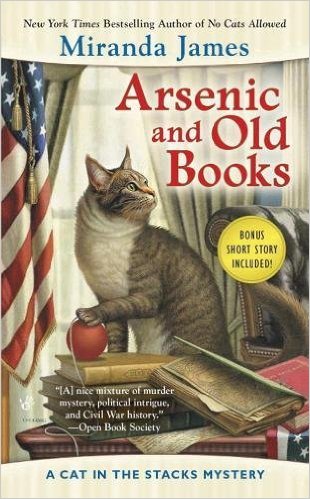 Arsenic and Old Books by
Arsenic and Old Books by 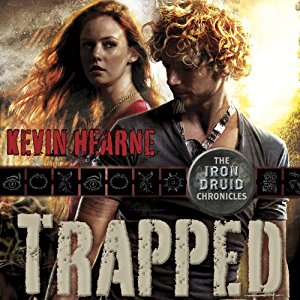 Trapped (The Iron Druid Chronicles, #5) by
Trapped (The Iron Druid Chronicles, #5) by 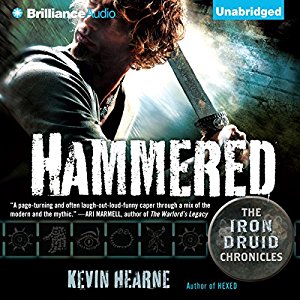 After all, back in
After all, back in 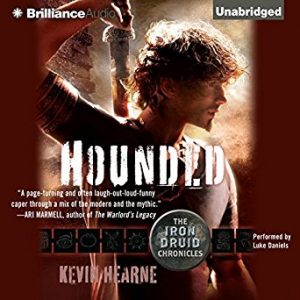 Escape Rating B+: Like all of the
Escape Rating B+: Like all of the  Bacchus is after him because Atticus killed a whole bunch of his baccantes back in
Bacchus is after him because Atticus killed a whole bunch of his baccantes back in  Fair warning, it ends on a cliffhanger of truly epic proportions! But that’s OK, because I’ve already got
Fair warning, it ends on a cliffhanger of truly epic proportions! But that’s OK, because I’ve already got 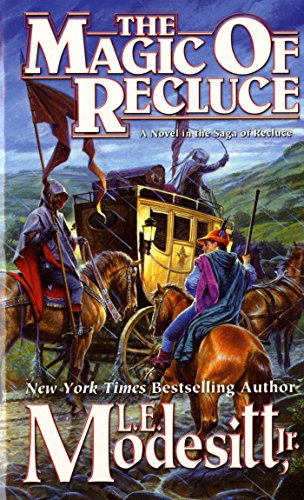 The Magic of Recluce (The Saga of Recluce #1) by
The Magic of Recluce (The Saga of Recluce #1) by 
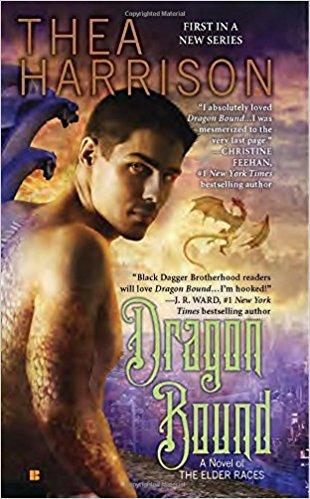 Dragon Bound (Elder Races, #1) by
Dragon Bound (Elder Races, #1) by 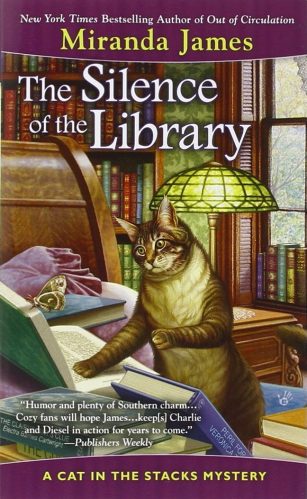 The Silence of the Library (Cat in the Stacks, #5) by
The Silence of the Library (Cat in the Stacks, #5) by 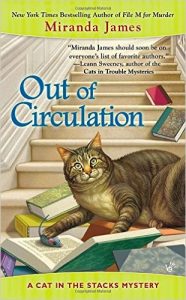 I opened The Silence of the Library immediately after I finished
I opened The Silence of the Library immediately after I finished